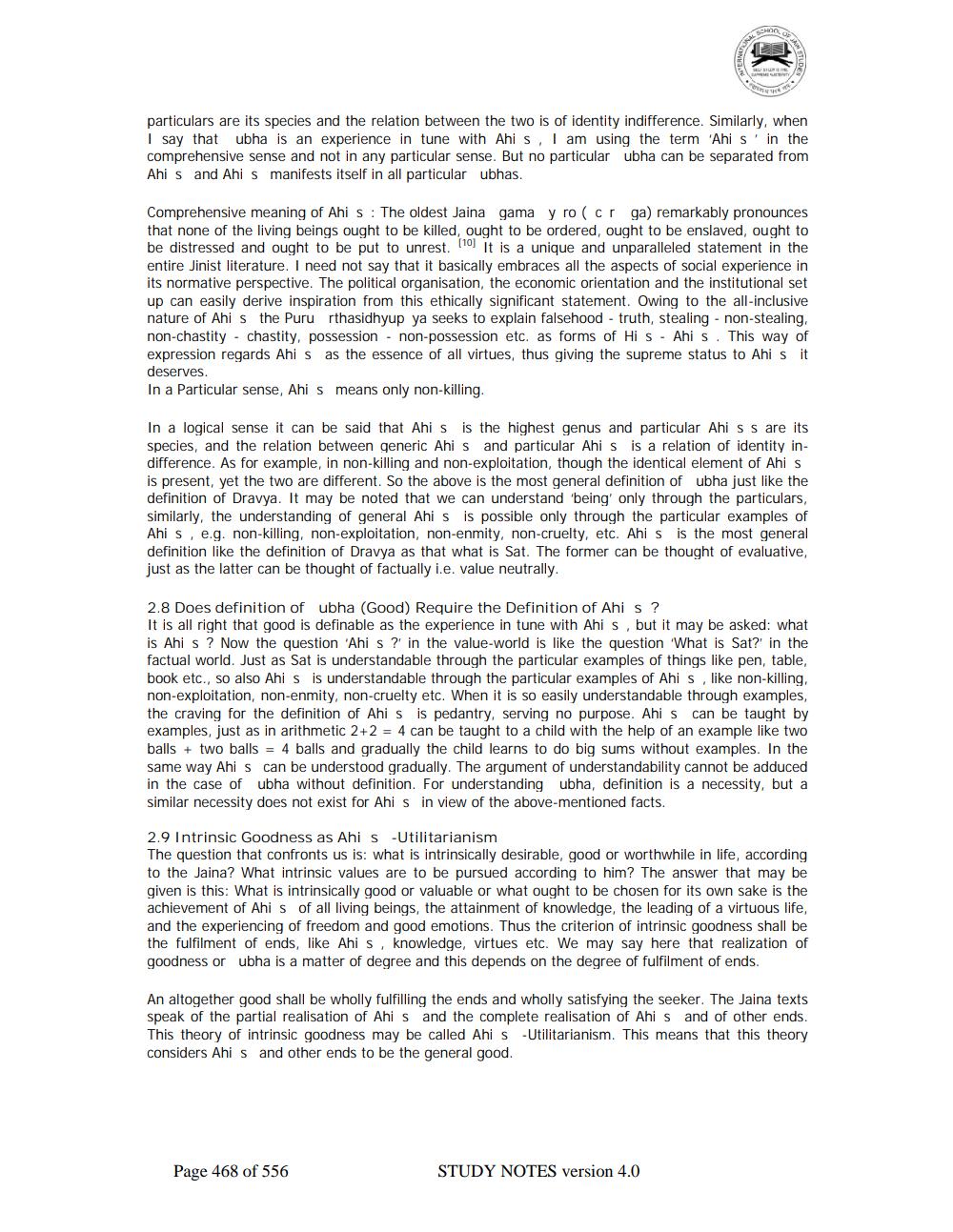________________
particulars are its species and the relation between the two is of identity indifference. Similarly, when I say that ubha is an experience in tune with Ahi s, I am using the term 'Ahi s' in the comprehensive sense and not in any particular sense. But no particular ubha can be separated from Ahi s and Ahis manifests itself in all particular ubhas.
Comprehensive meaning of Ahi s: The oldest Jaina gama y ro (cr ga) remarkably pronounces that none of the living beings ought to be killed, ought to be ordered, ought to be enslaved, ought to be distressed and ought to be put to unrest. [10] It is a unique and unparalleled statement in the entire Jinist literature. I need not say that it basically embraces all the aspects of social experience in its normative perspective. The political organisation, the economic orientation and the institutional set up can easily derive inspiration from this ethically significant statement. Owing to the all-inclusive nature of Ahi s the Puru rthasidhyup ya seeks to explain falsehood - truth, stealing non-stealing, non-chastity chastity, possession - non-possession etc. as forms of His - Ahi s. This way of expression regards Ahi s as the essence of all virtues, thus giving the supreme status to Ahi s it deserves.
In a Particular sense, Ahi s means only non-killing.
In a logical sense it can be said that Ahis is the highest genus and particular Ahi s s are its species, and the relation between generic Ahi s and particular Ahis is a relation of identity indifference. As for example, in non-killing and non-exploitation, though the identical element of Ahi s is present, yet the two are different. So the above is the most general definition of ubha just like the definition of Dravya. It may be noted that we can understand 'being' only through the particulars, similarly, the understanding of general Ahis is possible only through the particular examples of Ahi se.g. non-killing, non-exploitation, non-enmity, non-cruelty, etc. Ahi s is the most general definition like the definition of Dravya as that what is Sat. The former can be thought of evaluative, just as the latter can be thought of factually i.e. value neutrally.
2.8 Does definition of ubha (Good) Require the Definition of Ahi s ?
It is all right that good is definable as the experience in tune with Ahi s, but it may be asked: what is Ahi s? Now the question 'Ahi s?' in the value-world is like the question 'What is Sat?' in the factual world. Just as Sat is understandable through the particular examples of things like pen, table, book etc., so also Ahis is understandable through the particular examples of Ahi s, like non-killing, non-exploitation, non-enmity, non-cruelty etc. When it is so easily understandable through examples, the craving for the definition of Ahis is pedantry, serving no purpose. Ahi s can be taught by examples, just as in arithmetic 2+2 = 4 can be taught to a child with the help of an example like two balls + two balls = 4 balls and gradually the child learns to do big sums without examples. In the same way Ahi s can be understood gradually. The argument of understandability cannot be adduced in the case of ubha without definition. For understanding ubha, definition is a necessity, but a similar necessity does not exist for Ahi s in view of the above-mentioned facts.
2.9 Intrinsic Goodness as Ahi s -Utilitarianism
The question that confronts us is: what is intrinsically desirable, good or worthwhile in life, according to the Jaina? What intrinsic values are to be pursued according to him? The answer that may be given is this: What is intrinsically good or valuable or what ought to be chosen for its own sake is the achievement of Ahi s of all living beings, the attainment of knowledge, the leading of a virtuous life, and the experiencing of freedom and good emotions. Thus the criterion of intrinsic goodness shall be the fulfilment of ends, like Ahi s, knowledge, virtues etc. We may say here that realization of goodness or ubha is a matter of degree and this depends on the degree of fulfilment of ends.
An altogether good shall be wholly fulfilling the ends and wholly satisfying the seeker. The Jaina texts speak of the partial realisation of Ahi s and the complete realisation of Ahi s and of other ends. This theory of intrinsic goodness may be called Ahi s -Utilitarianism. This means that this theory considers Ahi s and other ends to be the general good.
Page 468 of 556
STUDY NOTES version 4.0




